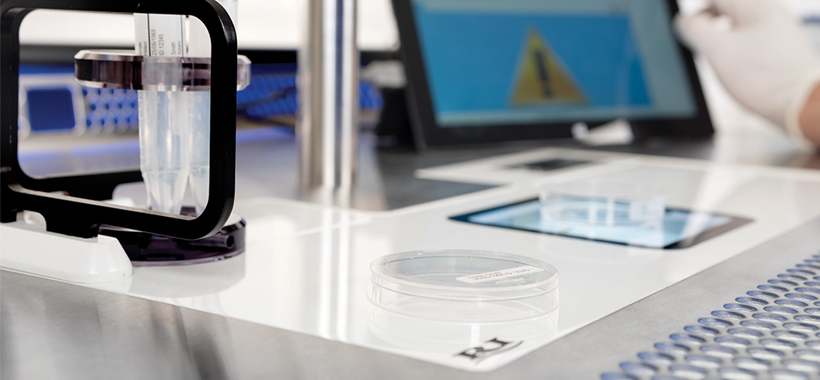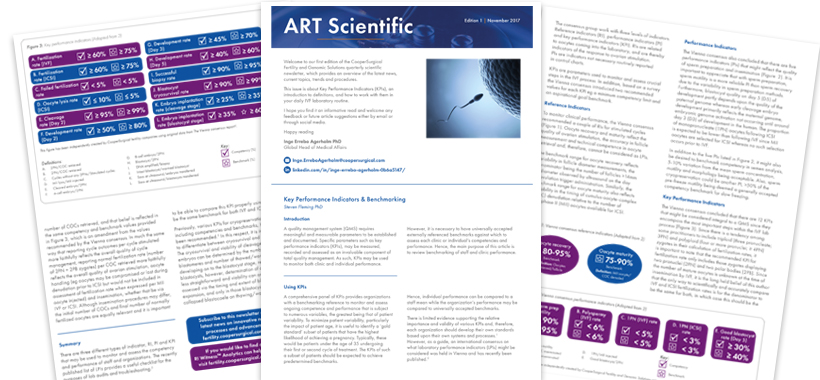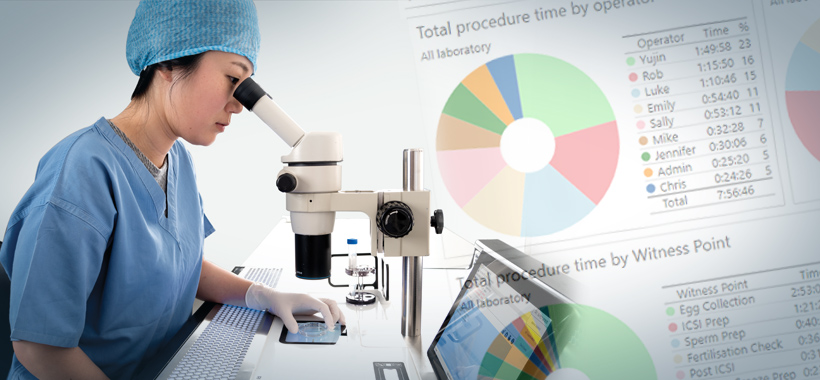Nurture Fertility, Nottingham, is a private IVF clinic. It is one of eight of The Fertility Partnership’s (TFP) clinics in the UK, with a further 12 sites across mainland Europe. All TFP clinics have RI Witness installed.
In 2015, Nurture Fertility Nottingham embarked on an ambitious plan to increase the number of IVF cycles it completed by 300% – moving from 500 to 1,500 cycles per annum – with the opening of its new, larger lab. The investment in new facilities was well-timed, as the clinic saw impressive growth, reaching 1,020 cycles by the end of 2016.
However, with this growth came an increased workload for their embryologists in the laboratory. At the time, Nurture Fertility used manual double witnessing to prevent mix-ups. This had long proven effective as no errors were recorded, but this security measure was very cumbersome and time consuming for the lab staff. With a doorbell installed at each workstation, whenever a witness was required, the operator would ring the bell and wait for a colleague to support them. As the number of cycles grew, so did the noise level within the lab due to the increased chiming of the doorbells!
The ambition to continue growing required improved workflow
The clinic was staffed with 6.2 full time equivalent lab staff (FTE) to conduct 1,020 cycles (a 1:165 embryologist/cycle number ratio). In addition to wasting time while waiting for a colleague to arrive for the witnessing step, manual witnessing also caused distraction and annoyance to those required to witness and others working in the lab.
The clinic felt that something had to be done, especially with the projected growth in mind, so they evaluated the use of electronic witnessing. However, as there had not been any previous errors at the clinic, the management team struggled to justify the expense and evaluate the return on investment.
An independent study described the potential for significant efficiencies
In 2017, the clinic commissioned an independent consulting company to conduct a study of Nurture Fertility’s existing workflow. The study compared the per cycle workload of Nurture Fertility’s existing manual double witnessing system to an RI Witness system. The study concluded that introducing RI Witness would reduce the time spent on witnessing per IVF cycle, and at 1,020 cycles annually, the gain would resemble roughly 1 FTE. The validation provided by the study justified investing in electronic witnessing and by September 2017, RI Witness was installed.
Less stress, improved working environment and greater productivity reported
At first, some members of staff were skeptical about the benefits of using an electronic witnessing system. Could an IT-system replace human witnessing performed by experienced embryologists?
“Such concerns were negated when RI Witness successfully replaced their manual double-witnessing process,” said Mahb Rahman, CooperSurgical’s UK Account Manager. “The lab saw a reduction in noise levels as the doorbell was used only to call for assistance at ‘critical process steps’ rather than at every process step.”
Lyndsey Zujovic, TFP Group Embryology Lead and Nurture Fertility Laboratory Manager, noted that following the introduction of RI Witness the staff reported lower stress levels and that their working environment was more comfortable.
Since 2017, the clinic has seen the number of cycles grow by 27%. However, due to increased staff productivity following the introduction of RI Witness, staff numbers in the lab have only increased by 10%, from 6.2 to 6.8 FTEs. The consultancy company’s prediction that RI Witness could contribute towards reducing the need for witnessing resources per cycle, has proved correct.
RI Witness Supporting IVF Quality Management
INTERVIEW: Victoria Ryder MSc, Fertility Laboratory Manager at Complete Fertility
A positive effect on quality management and oocyte quality
The recording of time spent on processes has been tracked using RI Witness Analytics. Using this functionality and the reports it generated, Nurture was able to identify the need to revise its standard operating procedures (SOPs) relating to oocyte denudation ahead of ICSI.
“We saw a correlation between time spent during denudation and damage rates during ICSI”, said Lyndsey. “Our revised SOP included an agreed parameter for the time samples spent in denudation media. This was tracked through RI Witness and we were able to record a lower oocyte damage rate for our ICSI cycles due to this change”.
Cycle overview screen displaying the status of ongoing cycles
“We also recommended that Nuture Fertility use the RI Witness cycle overview screen that tracks the workflow and is an electronic dashboard that displays the realtime status of ongoing cycles,” said Mahb. “It updates automatically once a process step has been completed, ensuring that the screen is constantly displaying a ‘real-time’ status of patients’ cycles for quick and easy reference. It has proved an efficient way to track planned tasks throughout the day.”
The future of standardization across the clinic group
Going forward, TFP is looking to standardize and harmonize processes across its group of clinics using the time-saving and quality-improving aspects of RI Witness identified, among others, with a special focus on tracking lot numbers of consumables used in patient cycles.
“As part of the harmonization process within TFP clinics, RI Witness has been fundamental in guiding our laboratory teams through the new processes via the Witness Point Diagram,” said Lyndsey. “This map sets out the steps in our unified culture system and guides our laboratory teams through the process step by step”.
In addition to the benefits relating to quality, efficiencies and the lab environment going forward, Lyndsey believes that RI Witness will facilitate simplified and enhanced training for new staff members thanks to how RI Witness guides lab staff through the clinic’s SOPs.
Such standardizations will help replicate best-practice and deliver an optimal and interchangeable workflow process to all within the TFP group, helping maintain high levels of excellence.

 My Clinic is in the United States
My Clinic is in the United States My Clinic is in Canada
My Clinic is in Canada


